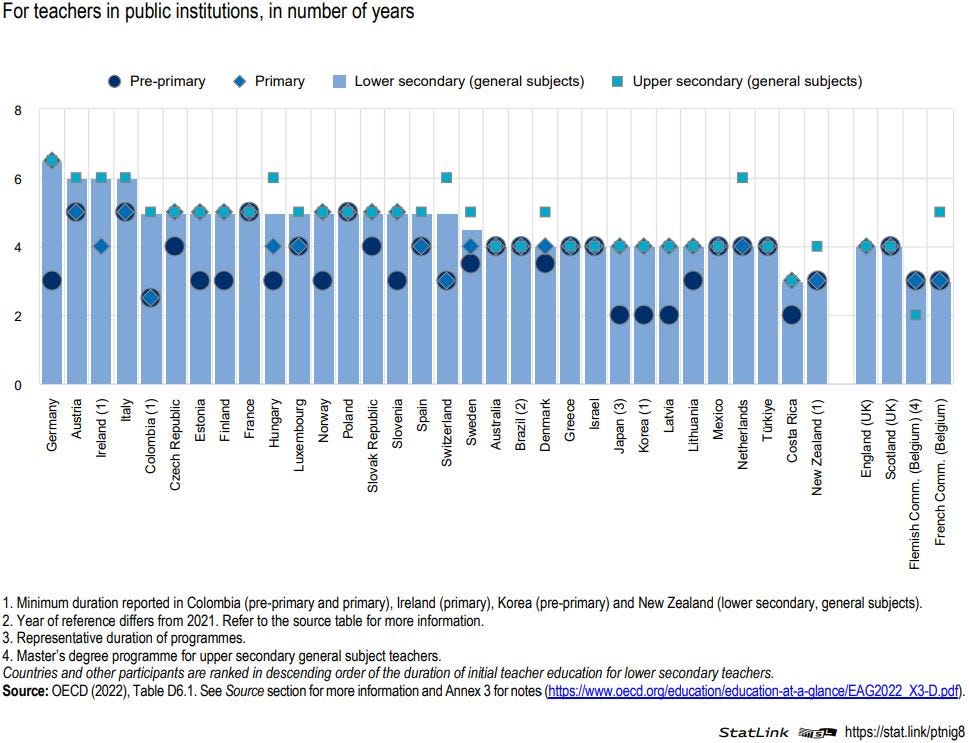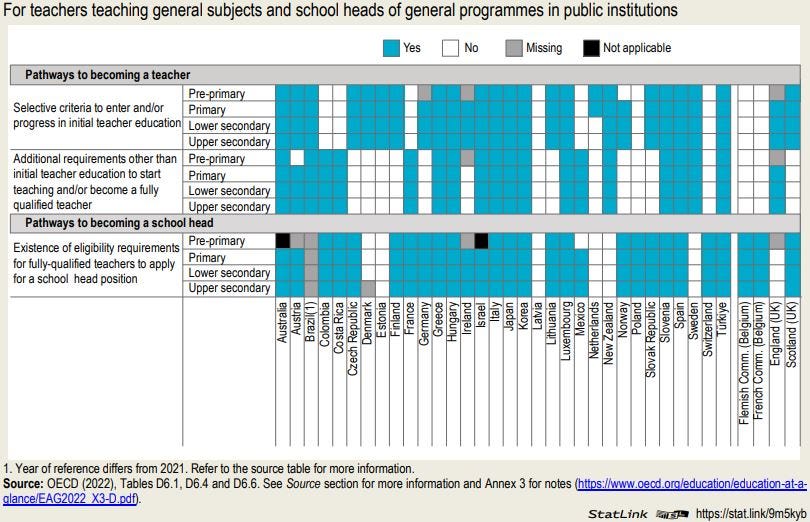Initial teacher preparation is the first step in the continuum of teacher learning and should mark the beginning, not the end, of the process of professional development. This involves considering teacher education as a continuous process, starting with attracting and selecting candidates, equipping them with the necessary competences through quality training, certification and registration, and then supporting their early development in schools.
Teacher initial education
The quality of teachers relies heavily on their initial education, which equips them with the knowledge and skills to teach effectively and to meet the needs of their institution and students.

Key messages
A coherent and comprehensive initial teacher education curriculum covers both content and pedagogical knowledge, and develops practical skills linked to theoretical knowledge. Ensuring that emerging evidence and new models of teaching and learning are regularly integrated in initial teacher education requires a continuous collective reflection on teachers’ knowledge involving both university- and school-based teacher educators. Strong partnerships between schools and teacher education institutions, or communities of collaborative enquiry, can facilitate this reflection and support the alignment of teacher education content and the school context.
Early professional development involves reflecting on teaching and learning based on research and should be part of an ongoing culture of professional learning. In addition to opportunities to refine teaching skills, new teachers need to engage in creative processes of reflection and evaluation of teaching and learning models, drawing on research evidence and student data in order for teacher learning to be ‘grounded in practice’. Mentoring programmes can be drivers of quality induction if they build on good practices. When induction and support programmes are integrated in a professional learning culture, schools are able to engage new teachers in innovation and continuous school improvement.
Context
Duration of initial teacher education programmes
In 2021 the duration of initial teacher education programmes varies from 3 years to 6.5 years for prospective lower secondary teachers of general subjects. Usually, it is similar for primary and secondary teachers, but shorter for pre-primary teachers. A tertiary qualification is awarded upon completion of the programme in most countries, regardless of the level of education at which the teacher will teach.
Duration of initial teacher education, by level of education (2021)

Pathways to becoming a teacher
Initial teacher education at pre-primary to lower secondary levels is organised according to the concurrent model (pedagogical and practical training provided at the same time as courses in academic subject matter) in more than 75% of OECD and partner countries. At upper secondary level, concurrent and consecutive (pedagogical and practical training come after courses in the academic subject matter) models are approximately as common.
Pathways to becoming a teacher or school head, by level of education (2021)

Related publications
Programmes and projects
-
The OECD Indicators of Education Systems (INES) programme seeks to gauge the performance of national education systems through internationally comparable data.Learn more
-
TALIS - the Teaching and Learning International Survey - is the world's largest international survey about teachers and school leaders.Learn more
-
The Teacher Knowledge Survey (TKS) examines what teachers know about teaching and learning, and how their specialised knowledge of pedagogy relates to their work and training.Learn more
-
PISA is the OECD's Programme for International Student Assessment. PISA measures 15-year-olds’ ability to use their reading, mathematics and science knowledge and skills to meet real-life challenges.Learn more
-
The Education Policy Outlook is an analytical observatory that monitors the evolution of policy priorities and policy developments from early childhood education to adult education, mainly among OECD education systems, to provide a comparative understanding of how policies are evolving, and how they can be best implemented or improved over time.Learn more
-
The OECD’s programme on education and skills policy support policymakers in their efforts to achieve high-quality lifelong learning, which in turn contributes to personal development, sustainable economic growth, and social cohesion.Learn more
-
Education for Inclusive Societies Project is designed to respond to the increasing diversity that characterises education systems, and seeks to help governments and relevant stakeholders achieve more equitable and inclusive education systems as a pillar to create more inclusive societies.Learn more
-
OECD Future of Education and Skills 2030 aims to build a common understanding of the knowledge, skills, attitudes and values students need in the 21st century.Learn more
-
The OECD’s expanding evidence base has highlighted the importance of high-quality teachers and teaching in education. Yet, challenging questions remain, and there is a need for space in the teacher debate to anticipate future developments, to strengthen professional identity and to support proactive teacher policy making.Learn more
-
Since 2013, the OECD has gathered evidence on how school resource policies work in different contexts. The focus is now on digital resources to enable countries to learn from each other in the digital transformation of their education.Learn more
-
Data and digital technologies are among the most powerful drivers of innovation in education, offering a broad range of opportunities for system and school management, as well as for teaching and learning. But they also create new policy issues as countries face challenges to reap the benefits of digitalisation in education while minimising its risks.Learn more
-
The Starting Strong Teaching and Learning International Survey (TALIS Starting Strong) is an international, large-scale survey of staff and leaders in early childhood education and care (ECEC).Learn more
-
Across the OECD, enormous investment and effort has aimed to reinforce the quality, production and use of education research in policy and practice. Despite this, strengthening the impact of research in education policy making and practice remains a challenge for many systems.Learn more
-
The OECD Survey on Social and Emotional Skills is an international survey that identifies and assesses the conditions and practices that foster or hinder the development of social and emotional skills for 10- and 15-year-old students.Learn more
-
Creativity and critical thinking prepare students for innovative economies and improve wellbeing. However, educators often lack guidance on how to equip students with creativity and critical thinking within subject teaching. Education systems have likewise rarely established ways to systematically assess students’ acquisition of creativity and critical thinking.Learn more





